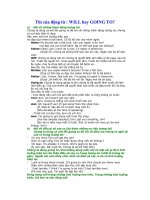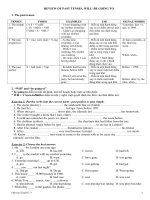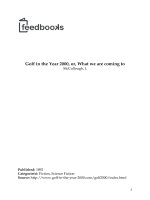ENLISH WORKBOOK 9
Bạn đang xem bản rút gọn của tài liệu. Xem và tải ngay bản đầy đủ của tài liệu tại đây (94.03 KB, 5 trang )
<span class='text_page_counter'>(1)</span><div class='page_container' data-page=1>
<b>Unit 1: MY FRIENDS</b>
<b>1. Complete the paragraph. Put the verbs in brackets into the correct form.</b>
<b>Vichai is my pen pal. He (1) is 14 years old. He (2) lives in a town house with his family in Bangkok,</b>
<b>Thailand. Yesterday I (3) received his letter. In the letter he said “I usually (4) have boiled rice for</b>
<b>breakfask, and chicken with fried rice or a bowl of noodles for lunch. I the evening, I (5) </b><i><b>eat the food</b></i>
<b>my mother (6) cookes. Her food (7) is the bes in the whole world”. Last week, I (8) wrote a letter to</b>
<b>him. I (9) introduced myself and (10) sent him a photograph of my family.</b>
<b>2. Correct the following sentences. Write two corect sentences each time.</b>
<b>Example: The sun rises in the west.</b>
<b> The sun doesn’t rise in the west. It rises in the east.</b>
<b>a) The moon goes round the sun. </b>
<b> The moon doesn’t go round the sun. </b>
<b>It goes round the Earth.</b>
<b>b) It is hot in winter.</b>
<b> It isn’t hot in winter. </b>
<b>It is hot in summer/It is cold in winter.</b>
<b>c) Mice catch cats.</b>
<b> Mice don’t catch cats. </b>
<b>Cats catch mice/Mice is caught by cats.</b>
<b>d) Water boils at 50 degrees Celsius.</b>
<b> Water doesn’t boil at 50 degrees Celsius. </b>
<b>Water boils at 100 degrees Celsius.</b>
<b>e) Spiders have six legs.</b>
<b> Spiders don’t have six legs. </b>
<b>Spiders have eight legs.</b>
<b>f) The Red River flows into the Atlantic Ocean.</b>
<b> The Red River doesn’t flow into the Atlantic Occean. </b>
<b>The Red River flows into the Pacific Ocean.</b>
<b>g) Gold is cheaper than silver.</b>
<b> Gold isn’t cheaper than silver. </b>
<b>Gold is more expensive than silver/Silver is cheaper than gold.</b>
<b>h) Carpenters make things from metal.</b>
<b> Carpenters don’t make things from metal. </b>
<b>Carpenters make things from wood.</b>
<b>3. Look at the people in the pictures on page 7. What do they look like? What are they wearing? Write</b>
<b>sentences describing them, using the words in the box on page 6.</b>
<b>young </b> <b>not very old</b> <b>tall</b> <b>short</b> <b>slim</b> <b>fat</b>
<b>short (long) hair</b> <b>a dress</b> <b>a skirt</b> <b>a suit</b> <b> a T-shirt and </b>
<b>jeans</b>
<b>pretty</b> <b>beautiful</b> <b>handsome </b> <b>ugly</b>
<b>Example:</b> <i><b>Thu is young.</b></i>
<i><b>She is slim.</b></i>
<i><b>She has long hair.</b></i>
<i><b>She is pretty.</b></i>
<i><b>She is wearing a dress.</b></i>
<b>a) Long isn’t very old.</b>
<b>He is fat and short.</b>
<b>He has short hair.</b>
<b>He is wearing a suit.</b>
<b>b) Nam is young.</b>
<b>He is tall.</b>
<b>He has short hair.</b>
<b>He is handsome.</b>
<b>He is wearing a T-shirt and jeans.</b>
<b>c) Lan is young.</b>
<b>She ia slim.</b>
<b>She has short hair.</b>
<b>She is beautiful.</b>
<b>She is wearing a skirt.</b>
<b>4. Complete the dialogue using the words in the box on page 8.</b>
</div>
<span class='text_page_counter'>(2)</span><div class='page_container' data-page=2>
<b>Who</b> <b>What</b> <b>good-looking</b>
<b>5. Combine each of the following pairs of sentences into one sentences, using (not) adjective + enough .</b>
<b>Example: He is strong. He can carry the box.</b>
<i><b> </b><b></b><b> He is strong enough to carry the box.</b></i>
<b>a) The weather wasn’t very warm. We couldn’t go swimming.</b>
<b> The weather wasn’t warm enough for us to go swimming.</b>
<b>b) He wasn’t very experienced. He couldn’t do the job. </b>
<b> He wasn’t experienced enough to do the job.</b>
<b>c) The ladder wasn’t very long. It didn’t reach the window.</b>
<b> The ladder wasn’t long enough to reach the window.</b>
<b>d) The tea isn’t strong. It won’t keep us awake. </b>
<b> The tea isn’t strong enough to keep us awake.</b>
<b>e) The fire isn’t very hot. It won’t boil the kettle. </b>
<b> The fire isn’t hot enough to boil the kettle.</b>
<b>f) The ice is quite thick. We can walk on it. </b>
<b> The ice is thick enough for us to walk on it.</b>
<b>g) It wasn’t very warm. We couldn’t sit in the garden. </b>
<b> It wasn’t warm enough for us to sit in the garden.</b>
<b>6. Complete each of the following sentences using “ enough ” as an adjective (before nouns) or</b>
<b>prepossition (after nouns) with one of the words in the box on page 10.</b>
<b>strong</b> <b>experience</b> <b>old</b> <b>chairs</b> <b>warm</b> <b>money</b> <b>cups</b>
<b>experienced</b> <b>time</b> <b>well</b> <b>room</b> <b>big</b> <b>qualifications</b>
<b>Example:</b>
<b>Bob can’t drive because he is not...</b>
<i><b></b></i>
<i><b> Bob can’t drive because he is not old enough.</b></i>
<b>I’d like to go on holiday but I haven’t got ...</b>
<i><b></b></i>
<i><b> I’d like to go on holiday but I haven’t got enough money.</b></i>
<b>a) There weren’t enough chairs for everyone to sit down.</b>
<b>b) The little boy is not strong enough to lift the suitcase.</b>
<b>c) Nam didn’t finish the exam because he didn’t have enough time.</b>
<b>d) Mr. Smith didn’t feel well enough to go to work this morning. </b>
<b>e) It’s only a small car, so there isn’t big enough for all of us.</b>
<b>f) Do you think I’ve got enough qualifications to apply for the job?</b>
<b>g) Try this jacket on and see if it’s enough room for you.</b>
<b>h) She couldn’t make coffee for everybody because there weren’t enough cups.</b>
<b>i) He wasn’t experienced enough for the job.</b>
<b>j) Are you warm enough or shall I switch on the heating?</b>
<b>k) Steve didn’t get the job because he didn’t have enough experience.</b>
<b>7. Write a paragraph about your close friend or pen pal. Use the following questions as prompts.</b>
<b>Loan:</b>
<b>Hoa:</b>
<b>Loan:</b>
<b>Hoa:</b>
<b>Loan:</b>
<b>Hoa:</b>
<b>Loan:</b>
<b>Hoa:</b>
<b>Loan:</b>
<b>Hoa:</b>
<b>Loan:</b>
<b>Hoa:</b>
<b>Hello, Hoa.</b>
<b>Hi, Loan. Where were you last Sunday?</b>
<b>I went to Ha Long Bay.</b>
<b>Who did you go with?</b>
<b>With some of my classnates and Paul.</b>
<b>(1) Who ia Paul?</b>
<b>One of my friends. He’s from France. Now he’s studying at the United Nations</b>
<b>International Schooll of Ha Noi.</b>
<b>(2) What does he look like?</b>
<b>He is (3) good-looking, with (4) dark hair and big brown eyes. He is very friendly.</b>
<b>Can he speak English?</b>
<b>His English is (5) excellent.</b>
</div>
<span class='text_page_counter'>(3)</span><div class='page_container' data-page=3>
<b>Nam is my pen pal. He is 14 years old. He lives at 164 Tran Phu Street with his parents and his sister. </b>
<b>He is tall, thin and he has short black hair. He likes eating chicken . He likes playing games in his free </b>
<b>time. His close friends are Khoa and Tu.</b>
<b>Unit 2: MAKING ARRANGEMENTS</b>
<b>1. Write sentences about what there people are going to be. Use the words in the box on page 13.</b>
<b>teacher</b> <b>interpreter</b> <b>pilot</b> <b>actor</b> <b>athlete</b>
<b>chef</b> <b>driver</b> <b>singer</b> <b>lawyer</b> <b>dancer</b>
<b>Example: Hai is learning to drive. </b>
<b> He is going to be a driver.</b>
<b>a) Lan is learning to dance. </b>
<b> She is going to be a dancer.</b>
<b>b) Hoa loves children. </b>
<b> She is going to be a teacher.</b>
<b>c) Tom and John are learning to fly. </b>
<b> They are going to be pilots.</b>
<b>d) Nam is studying law. </b>
<b> He is going to be a lawyer.</b>
<b>e) Bob’s at drama school. </b>
<b> He is going to be a actor.</b>
<b>f) Peter cooks very well. </b>
<b> He is going to be a chef.</b>
<b>g) Loan’s good at languages. </b>
<b> She is going to be a interpreter.</b>
<b>h) Linda can run very fast. </b>
<b> She is going to be a athlete.</b>
<b>i) Thu is very good at singing. </b>
<b> She is going to be a singer.</b>
<b>2. Make up queations for the following statements. </b>
<b>Example: I’m very thirsty. </b>
<b> What are you going to drink?</b>
<b>a) I’m very hungry. </b>
<b> What are you going to eat?</b>
<b>b) We’re going to the cinema. </b>
<b> What are you going to see?</b>
<b>c) My brother’s going to university in September. </b>
<b> What is he going to study?</b>
<b>d) My grandparents are coming for dinner tonight. </b>
<b> What are you going to cook?</b>
<b>e) Mr. and Mrs. Smith are going shopping. </b>
<b> What are they going to buy?</b>
<b>f) Ba is working hard for his exams. </b>
<b> When is he going to have exams?</b>
<b>g) It’s my brithday next week. </b>
<b> Are you going to have a brithday party?</b>
<b>h) Hoa’s not going by bicycle. </b>
<b> Is she going to go by bus?</b>
<b>i) We aren’t going to have a meeting on Friday. </b>
<b> Are you going to have a meeting on Saturday?</b>
<b>3. Look at all the things Ba has prepared for his summer activities on page 16 and complete the </b>
<b>sentences about his plan.</b>
<b> This summer Nam’s going to listen to music.</b>
<b>a) He’s going to play soocer.</b>
<b>b) He’s going to go swimming.</b>
<b>c) He’s going to read books.</b>
<b>d) He’s going to play computer games.</b>
<b>e) He’s going to go fishing.</b>
<b>f) He’s going to play chess.</b>
<b>g) He’s going to play table tennis.</b>
<b>4. Match the sentences in (I) with the appropriate response in (II).</b>
</div>
<span class='text_page_counter'>(4)</span><div class='page_container' data-page=4>
<b>D... Mr. Richard Klein: Yes, I’m going to travel to Ho Chi Minh City by train on Saturday.</b>
<b>b)...</b>
<b>.</b> <b>Receptionish:</b> <b>What time would you like to leave?</b>
<b>A... Mr. Richard Klein: Early in the morning, if possible.</b>
<b>c)... Receptionish:</b> <b>Would you like me to book you a ticket?</b>
<b>B...</b> <b>Mr. Richard Klein: Yes, please.</b>
<b>d)...</b>
<b>.</b>
<b>Receptionish:</b> <b>May I have your name, please?</b>
<b>F...</b> <b>Mr. Richard Klein: Richard Klein. K-L-E-I-N.</b>
<b>e)... Receptionish:</b> <b>Let me check the train timetable... Will 6.45 be all right?</b>
<b>E...</b> <b>Mr. Richard Klein: Yes, that’ll be fine.</b>
<b>f)...</b> <b>Receptionish:</b> <b>You can collect your ticket at the reception, just before you leave.</b>
<b>C... Mr. Richard Klein: At the reception? OK. I’ll see you before breakfast. Thank you very </b>
<b>much.</b>
<b>g)... Receptionish:</b> <b>Goodbye, sir.</b>
<b>5. Read each of the following sentences and put “I” for “Intention”, “P” for “Prediction”.</b>
<b>Example: </b>
<b>...I... I bought a pair of boots because I’m going to (go to) skiing this Sunday.</b>
<b>...P... Look at the blind man walking over there. There’s a hole in front of him. He’s going to fall into </b>
<b>the hole.</b>
<b>a) ...I...</b>
<b>b) ...I...</b>
<b>c) ...P...</b>
<b>d) ...I...</b>
<b>e) ...P...</b>
<b>f) ...P...</b>
<b>g) ...I...</b>
<b>h) ...P...</b>
<b>i) ...I...</b>
<b>j) ...I...</b>
<b>We are going to see “Romeo and Juliet” at the theather tonight. The tickets were very</b>
<b>expensive.</b>
<b>– What are you going to buy Loan for her birthday?</b>
<b>– A handbag.</b>
<b>The wind is very strong. The door is going to slam.</b>
<b>Mr. and Mrs. Smith are working hard these days to save money as much as they can </b>
<b>because they’re going to buy a new house.</b>
<b>There was very little blossom this spring. Apples are going to be scarce.</b>
<b>Mr. Hai has just got up. It’s a quarter to eight now, and he’s going to be late for work.</b>
<b>We’re going to stop here for a moment to get some petrol.</b>
<b>Look! The cat is running very slowly and she seems tired. She’s going to have kittens.</b>
<b>I’m not going to stay here another minute.</b>
<b>We’re going to take the children to the seaside this summer. </b>
<b>6. Complete the sentences, using the appropriate adverbs in the box on page 18.</b>
<b>outside inside there here upstairs downstairs</b>
<b>a) Last night someone broke into the kitchen and stole the microwave oven while we were </b>
<b>upstairs.</b>
<b>b) He fell downstairs and brike his wrist.</b>
<b>c) We like that city so much that we’re going there again this year.</b>
<b>d) The visitors had to move inside when it started to rain.</b>
<b> e) –Where do you live?</b>
<b> – I live here, in this town.</b>
<b>f)</b> <b>Don’t go outside, it’s too cold.</b>
<b>7. Write sentences about your plan for this summer. You may use the ideas on page 19.</b>
<b>– I’m going to visit my relatives this summer.</b>
<b>– I’m going to attend a summer course of English this summer.</b>
<b>– I’m going to help my parents with some work this summer.</b>
<b>– I’m going to go for a picnic with my friends this summer.</b>
<b>– I’m going to play some sports this summer.</b>
<b>– I’m going to read my favourite books this summer.</b>
<b>– I’m going to read my favourite novels this summer.</b>
<b>– I’m going to go to the movies this summer.</b>
</div>
<span class='text_page_counter'>(5)</span><div class='page_container' data-page=5>
<b>Unit 3: AT HOME</b>
<b>1. Complete the following sentences with have to or must:</b>
<b>Example: Oh! It’s late. I have to (must) go home now.</b>
<b>a) Many children in Britain must wear uniform when they go to school.</b>
<b>b) You really must work harder and harder for the coming examinations.</b>
<b>c) Many boys and girls in my school have to wear glasses because they are short-sighted.</b>
<b>d) I’m afraid I can’t come tomorrow. I have to work late to finish my project.</b>
<b>e) I must do my homework every day.</b>
<b>f) Sorry. We must go or we’ll miss the last train.</b>
<b>g) - Why does he have to get up early?</b>
<b> - Because he have to deliver milk to every house in the neighborhoor.</b>
<b>h) You must put knives out of children’s reach.</b>
<b>i) We haven’t got much time. We have to hurry.</b>
<b>2. You are giving advice to a friend. Use ought to or ought not to.</b>
<b>Example:</b>
<b>Your friend is always getting bad marks because he plays computer games too much. Advise him to </b>
<b>stop playing computer games.</b>
<b> You ought to stop playing computer games.</b>
<b>a) You friend has a bad toothache. Advise him go to the dentist.</b>
<b>You ought to go to the dentist.</b>
<b>b) Your friend is going to visit China. Advise him to learn a few Chinese words before he goes.</b>
<b>You ought to learn a few Chinese words before you go.</b>
<b>c) Your friend is riding a bicycle so fast. You think this is dangerous. Advise him not to do it.</b>
<b>You ought not to ride a bicycle so fast.</b>
<b>d) It’s very cold, but your friend is usually wearing T-shirts and jeans. Advise him to put on </b>
<b>warm clothes.</b>
<b>You ought to put on warm clothes.</b>
<b>e) Your friend has a bad cold. He has to go to the English Speaking Club this evening. Advise him</b>
<b>to stay at home.</b>
<b>You ought to stay at home.</b>
<b>f) Your friend is always watching TV. He’s going to have final exams. Advise him not to do it.</b>
<b>You ought not to watch TV.</b>
<b>g) Your friend begins smoking. Advise him to stop smoking.</b>
<b>You ought to stop smoking.</b>
<b>h) Your friend is going to study in the USA, but his English is poor. Advise him to improve his </b>
<b>English before he leaves.</b>
<b> You ought to improve your English before you leave. </b>
<b>3. Complete the following sentences, using myself, yourself, himself, herself, itself, ourselves, </b>
<b>themselves with the verbs in the box.</b>
<b> look after look at hurt enjoy </b>
<b> draw make clean repair </b>
<b>Example: John was lucky when he fell off his bike. He didn’t hurt himself.</b>
<b>a) - Who repaired the bicycle for you? – Nobody. I repaired it myself.</b>
<b>b) Don’t worry about us. We can look after ourselves.</b>
<b>c) The birthday party was great. They enjoyed themselves very much.</b>
<b>d) - Can you cleanthe window for me? </b>
<b> - Why don’t you clean them yourself.</b>
<b>e) Did you help your brother draw the painting? – No, he drew it himself.</b>
<b>f) The dog was in front of the mirror and look at itself.</b>
</div>
<!--links-->









